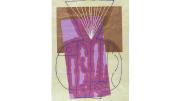The Harvard Advocate, a venerable publication now 154 years old, has published writers who have gone on to form much of the American literature we know in the twentieth century: poets John Ashbery ’49, Litt.D. ’01, Adrienne Rich ’51, Litt.D. ’90, Frank O’Hara ’50, Kenneth Koch ’48, Frederick Seidel ’57, translator Robert Fitzgerald ’33, composer Leonard Bernstein ’39, D.Mus. ’67, novelists Sallie Bingham ’58 and Francine Prose ’68, journalist James Agee ’32, and editor James Atlas ’71.
The Advocate traditionally publishes its spring issue in early April. But the COVID-19 pandemic, however, put a wrench in its production schedule.
Staff members adapted to this new reality on the fly. “With the sudden transition off-campus in March, members of the magazine found themselves editing and compiling the magazine remotely,” president Owen Torrey ’21 said. “We all met on Zoom calls across time-zones and found innovative ways to distribute the Advocate from around the world. The resulting spring issue is a collaborative effort among hundreds of students, as well as a testament to the ability of publications to forge community—no matter the distance—through art and literature.”
In their latest issue, prominent poet Dean Youngbegins with a question about material transformation:“Does everything have to become ash / to ascend?” Mario Bellatin, one of the leading literary voices in Latin America,imagines the possibility of “bodies cleaned of their corporeality” in his short story “Placeres.”
Student contributors include current Harvard Magazine Ledecky Fellow Che Applewhaite ’21, with a work that explores the contemporary art landscape in New York City through the eyes of Frederick Douglass, and former Ledecky fellow Tawandu Mulalu ’20, with his poem “Argo, My Argo.”
Some selections from the new issue are available online; for information on how to subscribe to print issues or submit written work, visit theharvardadvocate.com.











